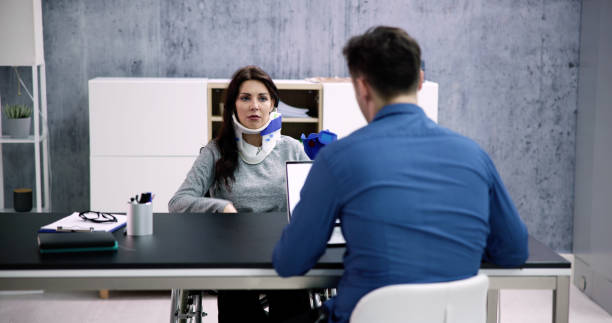Why Do Some Disability Claims Get Denied? A Lawyer’s Perspective
Applying for disability benefits can be an overwhelming and complicated process, requiring applicants to submit extensive documentation and adhere to strict guidelines. Unfortunately, many claims are denied due to common mistakes, missing information, or failure to meet eligibility requirements. Understanding the reasons behind claim denials and the importance of medical evidence can significantly improve your chances of approval. In this article, we will explore the major reasons why disability claims are denied, the role of medical evidence in the process, and essential tips to strengthen your application. By addressing these key issues, you can navigate the system more effectively and secure the financial assistance you need.
Common Reasons for Disability Claim Denials
Disability claims are frequently denied due to several recurring issues. Recognizing these pitfalls can help applicants avoid them and present a stronger case.
1. Insufficient Medical Evidence
One of the most common reasons for denial is the lack of adequate medical documentation. The Social Security Administration (SSA) requires detailed proof of your condition and its impact on your ability to work. Without comprehensive medical records, your claim may be dismissed as unsubstantiated.
2. Failure to Meet Eligibility Criteria
The SSA has strict guidelines for qualifying disabilities. If your condition does not meet their criteria or you cannot demonstrate how it limits your ability to work, your claim may be denied.
3. Inconsistencies in Application Information
Discrepancies between your application and medical records can raise red flags. For example, if you claim an inability to perform certain tasks but are later seen engaging in those activities, it can lead to a denial.
4. Non-adherence to Prescribed Treatment
Failing to follow your doctor’s recommended treatment plan can suggest that your condition is not as severe as claimed. This can result in a denial of benefits.
5. Incomplete Applications
Missing information or documentation is another frequent cause of denials. Even minor omissions can lead to significant setbacks in the approval process.
The Role of Medical Evidence in Disability Claims
Medical evidence is the backbone of any disability claim. It provides the necessary proof to validate your condition and its impact on your daily life. Here’s why it’s critical:
- Establishes the Severity of Your Condition
- Medical records, test results, and doctor’s statements must clearly outline the severity of your disability and how it affects your ability to work.
- Supports Your Claim with Credible Documentation
- Comprehensive medical evidence includes:
- Detailed medical records
- Treatment history
- Test results
- Statements from healthcare providers
- Connects Your Condition to Work Limitations
- A diagnosis alone is not enough. You must demonstrate how your condition prevents you from performing job-related tasks.
For example, if you have a back injury, your medical records should include imaging results, treatment plans, and a doctor’s explanation of how the injury limits your mobility and ability to lift or stand for extended periods.

Ready to connect with top legal professionals? Get immediate support— Call us at 877-550-8911.
Connect with Our Legal Team
How Incomplete Applications Lead to Denial?
Submitting an incomplete application is a common yet avoidable mistake. Here’s how it can impact your claim:
- Missing Documentation
- Applications often require extensive documentation, including medical records, employment history, and personal statements. Missing any of these can result in a denial.
- Failure to Follow Guidelines
- Each disability claim has specific requirements. Failing to adhere to these guidelines can lead to automatic rejection.
To avoid these issues, applicants should:
- Review the application guidelines thoroughly.
- Gather all necessary medical and employment records.
- Double-check the application for completeness before submission.
For more detailed guidance on navigating the application process, visit Legal Case Review.
The Importance of Timely Appeals in Disability Claims
If your claim is denied, filing a timely appeal is crucial. Delays can result in lost benefits or forfeiture of your claim. Here’s what you need to know:
- Understand the Reasons for Denial
- Review the denial letter carefully to identify the specific reasons for rejection. This will help you address the issues in your appeal.
- Gather Additional Evidence
- Strengthen your appeal by providing comprehensive medical documentation, treatment history, and statements from healthcare providers.
- Seek Legal Assistance
- A lawyer can help you navigate the appeals process, represent you at hearings, and improve your chances of a favorable outcome.
A Lawyer’s Perspective on Navigating Denied Claims
From a legal standpoint, denied claims often stem from preventable errors. Here’s what lawyers emphasize:
- Comprehensive Medical Documentation
- Ensure your medical records are thorough and up-to-date. This includes evaluations from specialists and detailed treatment plans.
- Consistency in Application Information
- Avoid discrepancies between your application and medical records. Consistency is key to building a credible case.
- Adherence to Treatment Plans
- Follow your doctor’s recommendations and maintain detailed records of your treatments. This demonstrates the seriousness of your condition.
Tips for Strengthening Your Disability Claim Application
To improve your chances of approval, consider these essential tips:
- Provide Comprehensive Medical Records: Include test results, doctor statements, and treatment history.
- Explain How Your Disability Affects Daily Life: Provide specific examples of limitations in performing routine activities.
- Follow Application Guidelines: Ensure that all sections of the application are completed accurately.
- Seek Legal Assistance: A lawyer can help navigate the complex application and appeals process.
- Meet Deadlines: Submit applications and appeals within the required timeframe.
For additional resources on disability claims, visit SSA’s official website.
FAQs
1. What is the most common reason for disability claim denials?
The most common reason is insufficient medical evidence. Applicants must provide comprehensive documentation to support their claims.
2. Can I appeal a denied disability claim?
Yes, you can file an appeal. It’s crucial to act quickly and gather additional evidence to strengthen your case.
3. How long does the disability claims process take?
The process can take several months to over a year, depending on the complexity of your case and whether an appeal is necessary.
4. Do I need a lawyer to apply for disability benefits?
While not mandatory, a lawyer can significantly improve your chances of approval by helping you navigate the process and present a strong case.
5. What should I do if my claim is denied?
Review the denial letter, gather additional evidence, and file an appeal within the specified timeframe.
Understanding wrongful death damages can provide some relief during a difficult time, ensuring that justice is served and financial burdens are eased.
Don’t wait to secure the legal representation you deserve. Visit Legal Case Review today for free quotes and tailored guidance, or call 877-550-8911 for immediate assistance.




